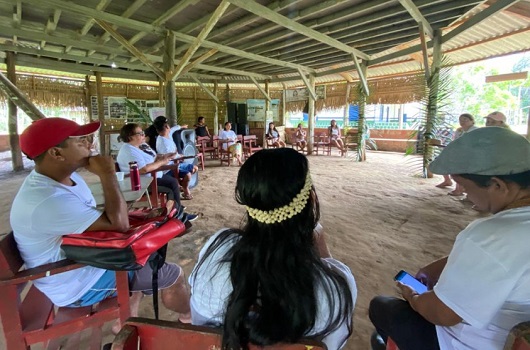Indigenous communicators receive training in traditional medicine
28/07/2022
Fiocruz Amazônia
The Leonidas & Maria Deane Institute (ILMD/Fiocruz Amazônia), in partnership with the United Nations Children's Fund (UNICEF) and non-governmental organizations Indigenous Medicine Center and Health of the Indigenous Peoples of the Amazon, promoted the Training Workshop of Young Indigenous Communicators, with the theme Indigenous Medicine. The objective was to prepare communicators who will follow in the future the workshops on traditional teaching of indigenous medicine, respecting and contributing to the preservation of the traditions and customs of each people.
The workshop addressed the different aspects of narratives through communication tools and on health care and healing practices of indigenous peoples (photo: Fiocruz Amazônia)
The knowledge will be applied in the territories covered by the Echo Project, developed by Fiocruz Amazônia in partnership with UNICEF. "The idea is to encourage them to go out in the field to capture images and make records related to the daily lives of their communities. We at Fiocruz Amazônia will be responsible for editing this material," explains Júlio Schweickardt, head of the Laboratory of History, Public Policy and Health in the Amazon (Lahpsa) and a researcher at ILMD/Fiocruz Amazônia. The workshop was taught by indigenous specialist João Paulo Tukano and journalist and documentary filmmaker Flávia Abtibol.
During the workshop, the different aspects of the narratives were approached through communication tools and on health care and healing practices of indigenous peoples. In the program there was an exhibition on the importance of kihti ukuse (mythical narratives), bahsese (blessings) and bahsamori (rituals), the three fundamental concepts of the practical-scientific knowledge of indigenous peoples, in addition to the health care and healing system, with blessings and use of medicinal plants, actions against COVID-19, guidance on video production and practical activities.
"Indigenous medicine is the recognition of wisdom and practices based on beliefs and experiences of different cultures used in the maintenance of health. Thus, this training with indigenous communicators strengthens the preservation of knowledge historically passed on among peoples for the prevention, diagnosis, treatment and improvement of diseases", explains the health and HIV specialist of Unicef Brazil, Antônio Carlos Cabral.
Participants will add knowledge and communication strategies to their organizations and communities (photo: Fiocruz Amazônia)
"This opportunity helps communicators convey their demands and of their communities. They already work very well in mediating the information that is sent to the base. In addition to the fact that they are future leaders who will add knowledge and communication strategies in their organizations and communities," says Anderson Teles Marques, who is part of the group of young indigenous communicators.
For Júlio Schweickardt, the communicators' workshop is nothing more than an opportunity to exchange knowledge and experiences. He recalls that Fiocruz Amazônia and UNICEF work in a partnership in the preparation of a diagnosis of the impact of the COVID-19 pandemic on indigenous communities and, in this sense, the transmission of knowledge via young communicators is of great relevance.
The ECHO COVID project, coordinated by Lahpsa Public Health researcher Michele Rocha de Araújo El Kadri, aims to strengthen the response to the pandemic in surveillance, mental health and traditional medicine with indigenous peoples from four states (Amazonas, Roraima, Pará and Maranhão). The project is based on resources from the European Civil Protection and Humanitarian Aid Operations (ECHO).





